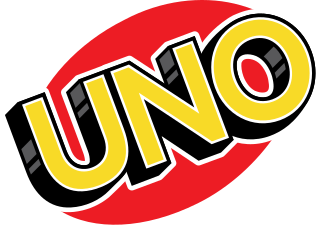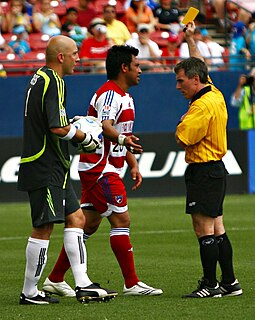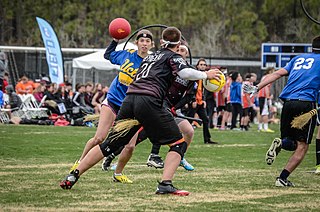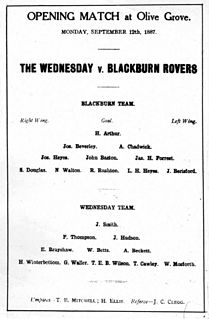
Association football, more commonly known as football or soccer, is a team sport played with a spherical ball between two teams of eleven players. It is played by 250 million players in over 200 countries and dependencies, making it the world's most popular sport. The game is played on a rectangular field called a pitch with a goal at each end. The object of the game is to score by moving the ball beyond the goal line into the opposing goal.

Field hockey is a team game of the hockey family. The earliest origins of the game date back to the Middle Ages in Pakistan. The game can be played on grass, water turf, artificial turf or synthetic field as well as an indoor board surface. Each team plays with eleven players, including the goalie. Players use sticks made out of wood, carbon fibre, fibre glass or a combination of carbon fibre and fibre glass in different quantities to hit a round, hard, plastic ball. The length of the stick depends on the player's individual height. Only one face of the stick is allowed to be used. Goalies often have a different kind of stick, however they can also use an ordinary field hockey stick. The specific goal-keeping sticks have another curve at the end of the stick, this is to give them more surface area to save the ball. The uniform consists of shin guards, shoes, shorts, a mouth guard and a jersey. Today, the game is played globally, mainly in parts of Western Europe, South Asia, Southern Africa, Australia, New Zealand, Argentina, and parts of the United States. Known simply as "hockey" in many territories, the term "field hockey" is used primarily in Canada and the United States where ice hockey is more popular. In Sweden, the term "landhockey" is used and to some degree also in Norway where it is governed by Norway's Bandy Association.

Uno is an American shedding-type card game that is played with a specially printed deck. The game's general principles put it into the Crazy Eights family of card games. The game was originally developed in 1971 by Merle Robbins in Reading, Ohio, a suburb of Cincinnati. It has been a Mattel brand since 1992. When his family and friends began to play more and more, he spent $8,000 to have 5,000 copies of the game made. He sold it from his barbershop at first, and local businesses began to sell it as well. Robins later sold the rights to UNO to a group of friends headed by Robert Tezak, a funeral parlor owner in Joliet, Illinois, for $50,000 plus royalties of 10 cents per game. Tezak formed International Games, Inc., to market UNO, with offices behind his funeral parlor. The games were produced by Lewis Saltzman of Saltzman Printers in Maywood, Illinois. In 1992, International Games became part of the Mattel family of companies. There can be 2-10 players.

Futsal is a variant of association football played on a hard court, smaller than a football pitch, and mainly indoors. It can be considered a version of five-a-side football.

Forty-Fives is a trick-taking card game that originated in Ireland. The game is popular in many communities throughout Atlantic Canada as well as the Gaspé Coast in Québec. Forty-fives is also played in parts of Massachusetts and southern New Hampshire in New England, United States, as well as in the South Island of New Zealand.
Overtime or extra time is an additional period of play specified under the rules of a sport to bring a game to a decision and avoid declaring the match a tie or draw where the scores are the same. In some sports, this extra period is played only if the game is required to have a clear winner, as in single-elimination tournaments where only one team or players can advance to the next round or win the tournament. In other sports, particularly those prominently played in North America where ties are generally disfavored, some form of overtime is employed for all games.

The Yokohama DeNA BayStars are a professional baseball team in the Japanese Central League. Their home field is Yokohama Stadium, located in central Yokohama. The team has been known by several names since becoming a professional team in 1950. It adopted its current name in 2011 when the club was purchased by software company DeNA.

Shunsuke Nakamura is a Japanese professional footballer who plays as an attacking midfielder for Júbilo Iwata in J1 League. He is the first and only person to have been named J.League Most Valuable Player more than once, receiving the award in 2000 and 2013. He is well known for his vision, touch, bending shots and free kick-taking abilities; Steve Perryman once remarked that Nakamura "could open a tin of beans with his left foot".

American and Canadian football are gridiron codes of football that are very similar. Both have their origins in rugby football. There are, however, some key differences.

Beach Soccer, also known as beach football, sand football or beasal, is a variant of association football played on a beach or some form of sand.
The UEFA European Football Championship has its own video games licensed from European football's governing body, UEFA. Six games have been released so far, with the first game released in 1996. Originally held by Gremlin Interactive, it was then held by Electronic Arts from Euro 2000 until Euro 2012. Konami have the rights for Euro 2016.

Yokohama FC is a Japanese football club based in the city of Yokohama. The club was formed by fans of Yokohama Flügels as a protest against Flügels' merger with Yokohama Marinos in 1999, becoming the first supporter-owned professional sports team in Japan.

In the sport of association football, fouls and misconduct are acts committed by players which are deemed by the referee to be unfair and are subsequently penalized. An offense may be a foul, misconduct or both depending on the nature of the offence and the circumstances in which it occurs. Fouls and misconduct are addressed in Law 12 of the Laws of the Game.

Penalty cards are used in many sports as a means of warning, reprimanding or penalising a player, coach or team official. Penalty cards are most commonly used by referees or umpires to indicate that a player has committed an offense. The official will hold the card above his or her head while looking or pointing towards the player that has committed the offence. This action makes the decision clear to all players, as well as spectators and other officials in a manner that is language-neutral. The colour or shape of the card used by the official indicates the type or seriousness of the offence and the level of punishment that is to be applied. Yellow and red cards are the most common, typically indicating, respectively, cautions and dismissals.

Quidditch is a sport of two teams of seven players each mounted on broomsticks played on a hockey rink-sized pitch. It is based on a fictional game of the same name invented by author J. K. Rowling, which is featured in the Harry Potter series of novels and related media.[3] The game is also sometimes referred to as muggle quidditch to distinguish it from the fictional game, which involves magical elements such as flying broomsticks and enchanted balls. In the Harry Potter universe, a "muggle" is a person without the power to use magic.
Little League World Series Baseball is a series of sports video games. Based on the Little League World Series, there are three games in the series. No game in the series was released after 2010.

Yokohama Sports & Culture Club, commonly referred to as simply YSCC or YSCC Yokohama is a Japanese multisports club based in Yokohama. Although they compete in a number of different sports, YSCC is best known for its association football team that currently plays in J3 League.
Keita Endo is a Japanese footballer who plays for Yokohama F. Marinos.
Yūya Yanagi is a professional Japanese baseball player. He plays pitcher for the Chunichi Dragons.
The 2019 J1 League, also known as the Meiji Yasuda J1 League for sponsorship reasons, is the 27th season of J1 League, the top Japanese professional league for association football clubs, since its establishment in 1993.






















